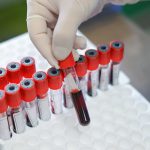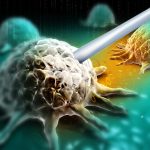-
Get Involved
Stitching SupportFourteen-year-old Giuliana Demma sews colorful hospital gowns for children receiving cancer treatment.
by Thomas Celona
-
Treating HER2-ultralow Breast Cancer
FDA approval expands treatment options for people with metastatic breast cancer that expresses minimal levels of HER2.
by Sandra Gordon
-
Screening Options for People With Dense Breasts
Reports on breast density inform women of their status but raise questions about what to do next.
by Robin Roenker
-
Treating Smoldering Multiple Myeloma
A monoclonal antibody drug reduced the risk of smoldering myeloma progressing to multiple myeloma in patients at high risk for disease progression.
by Sandra Gordon
-
Immunotherapy Improves Survival in Bladder Cancer
New research indicates that adding immunotherapy to muscle-invasive bladder cancer treatment can improve event-free and overall survival.
by Laura Gesualdi-Gilmore
-
Delaying Treatment Resistance
Adding a CDK 4/6 inhibitor extends progression-free survival for people with metastatic HR-positive, HER2-positive breast cancer.
by Thomas Celona
-
Forward Look
Speeding Up Multiple Myeloma Drug DevelopmentHematologist-oncologist C. Ola Landgren explains how measuring minimal residual disease could be useful in multiple myeloma clinical trials.
by Anna Azvolinsky
-
From the Editor-in-Chief
A New Treatment for Some Brain TumorsA recently approved therapy targets abnormal enzymes produced by gene defects.
by William G. Nelson, MD, PhD
-
Forward Look
Stem Cell Transplant Rates Decrease for LymphomaMore patients are receiving CAR T-cell therapy for large B-cell lymphoma.
by Leah Lawrence
-
Forward Look
Mobilizing an Immune Response in Metastatic Prostate CancerA new approach that uses a probe to freeze tumor cells followed by an infusion of immune-boosting drugs shows promising results in an early clinical trial.
Cancer Talk
Many People Don’t Get Colonoscopy After Receiving Abnormal Blood Tests
About half of people who receive abnormal results from colorectal cancer screening tests don’t follow up with a colonoscopy.
by Laura Gesualdi Gilmore
Can Steroids Impair Immunotherapy for Cancer?A new study suggests steroids could blunt the effects of some immunotherapies, but researchers say they remain necessary for some patients.
by Kyle Bagenstose
Treatment Combination Improves Survival in Platinum-resistant Ovarian CancerPreliminary results found that combining relacorilant with nab-paclitaxel improved outcomes for women with advanced ovarian cancer.
by Sandra Gordon
CAR T-cell Therapy Shows Response in Rare Brain CancerPotential new approach to treating diffuse intrinsic pontine glioma uses engineered immune cells infused directly to the brain.
by Taneia Surles















